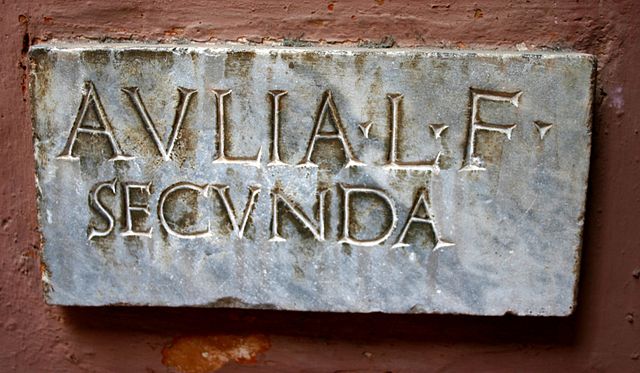The gens Flavia was a plebeian family at ancient Rome. Its members are first mentioned during the last three centuries of the Republic. The first of the Flavii to achieve prominence was Marcus Flavius, tribune of the plebs in 327 and 323 BC; however, no Flavius attained the consulship until Gaius Flavius Fimbria in 104 BC. The gens became illustrious during the first century AD, when the family of the Flavii Sabini claimed the imperial dignity.
The emperor Vespasian, from the Museo Nazionale Romano.
Constantine and Helena. Mosaic in Saint Isaac's Cathedral, Petersburg, Russia
Over the course of some fourteen centuries, the Romans and other peoples of Italy employed a system of nomenclature that differed from that used by other cultures of Europe and the Mediterranean Sea, consisting of a combination of personal and family names. Although conventionally referred to as the tria nomina, the combination of praenomen, nomen, and cognomen that have come to be regarded as the basic elements of the Roman name in fact represent a continuous process of development, from at least the seventh century BC to the end of the seventh century AD. The names that developed as part of this system became a defining characteristic of Roman civilization, and although the system itself vanished during the Early Middle Ages, the names themselves exerted a profound influence on the development of European naming practices, and many continue to survive in modern languages.

Quintus Fabius Maximus Verrucosus, surnamed "Cunctator". Maximus was the branch of the Fabia gens to which he belonged; Verrucosus was a personal cognomen referring to a wart above his upper lip; Cunctator a cognomen ex virtute referring to his delaying strategy against Hannibal. Statue at Schönbrunn Palace, Vienna
"Dedicated by the emperor Caesar, son of the divine Marcus Antoninus Pius, brother of the divine Commodus, grandson of the divine Antoninus Pius, great-grandson of the divine Hadrian, great-great-grandson of the divine Trajan, conqueror of Parthia, great-great-great-grandson of the divine Nerva, Lucius Septimius Severus Pius Pertinax Augustus Arabicus Adiabenicus, father of his country, Pontifex Maximus, holding the tribunician power for the fourth year, in the eighth year of his imperium, consul for the second time; and
Avlia L.F. Secunda Aulia Secunda, daughter of Lucius
Image: Louvre Lens Les Étrusques et la Méditerranée 001 Vatican, musée grégorien étrusque, inv. 13848 (Tête de statue masculine) (A)






